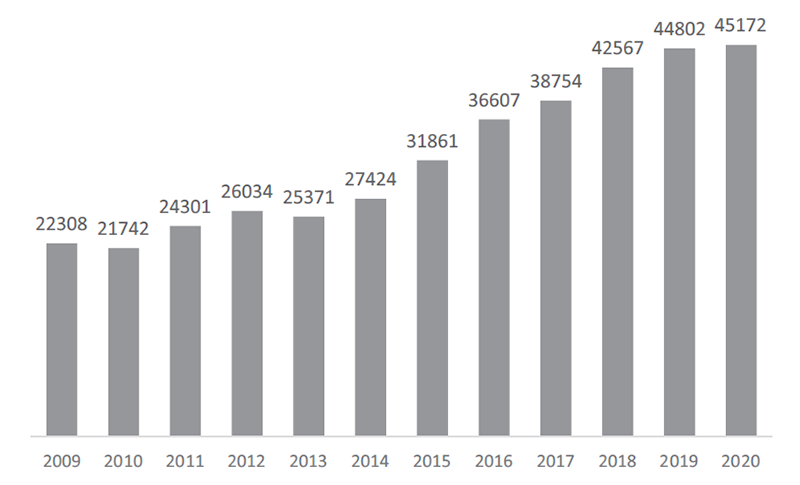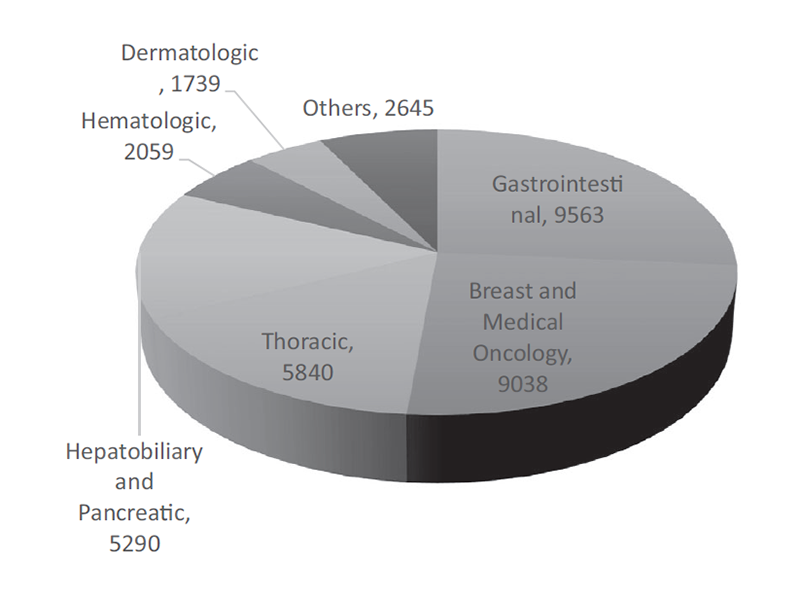Annual Report 2020
Outpatient Treatment Center
Shunsuke Kondo, Satoru Iwasa, Shimoi Takanori, Ohkuma Yusuke, Shinichi Makita, Yasuji Miyakita, Miho Nakajima, Aiko Maejima, Dai Ogata, Toru Akagi, Ryoko Udagawa, Kimihiko Kawamura, Fumiko Mori, Mihoko Asanabe, Saori Takiyama, Mayu Harada, Noriko Mori
Introduction
The Outpatient Treatment Center manages all kinds of cancer patients who have received chemotherapies as outpatients. Our mission is to provide safe, comfortable and high quality standard chemotherapies. Several groups collaborate to ensure the best chemotherapies, consisting of medical oncologists, nurses, pharmacists, medical social workers (MSW) and clinical research coordinators (CRCs). Our visions are: 1) to provide an evidenced-based medicine (EBM) and develop novel anti-cancer drugs, 2) to provide safe and efficient treatments and manage the adverse events, and 3) to create a comfortable environment to maintain the patients' quality of life.
The Team and What We Do
- Setup
Our division consists of one managing director (S.K), and other eight medical doctors, one deputy nurse director, one nurse manager, three deputy nurse managers, one deputy drug director, one chief pharmacist, one dispensing chief, one chief engineer in Dept. of Clinical Laboratory, 27 nurses, two pharmacists, and two or three reception staff.
- Performance
We set up the second Outpatient Treatment Center at the beginning of 2015. There are 30 beds in 1st Outpatient Treatment Center and 26 in 2nd Outpatient Treatment Center (total of 56 beds). We also have 6 beds for general infusions and blood transfusions.
In 2020, the Outpatient Treatment Center supported 45,172 patients who were administered anti-cancer drugs (Figure 1). The breakdown by department was Breast and Medical Oncology (n=9,038), Gastrointestinal Medical Oncology (n=9,563), Hepatobiliary and Pancreatic Oncology (n=5,290), Thoracic Oncology (n=5,840), Hematology (n=2,059), Dermatologic Oncology (n = 1,739) and other departments (n=6,194) (Figure 2). General infusions, general intramuscular or subcutaneous injections, blood transfusions, bone marrow punctures, lumbar punctures, intraperitoneal or chest drainage, and blood gas analyses were conducted at the center.
Figure 1. Cumulative number of patients who were intravenously administered anticancer drugs


- Staff Meeting
Staff meetings are held on the second Thursday of each month at 16:30-17:30, with the participation of physicians and nurses who are main members of the center. The steering committee meetings are held on the third Thursday of each month.
- Telecare and Conference
We conducted telephone consultation (Telecare) for outpatients who have received chemotherapies. We have approximately 120 cases per month. The case conferences that specifically discuss telecare are held each month (on Tuesday) with the participation of multidisciplinary specialists, including medical oncologists, nurses, and pharmacists.
Research activities
- Operation of early morning time frame
- Support for working in investigational drugs including PK study
- Safety management of allergic reactions and infusion reactions
- Telecare for emergencies for outpatients who receive chemotherapy
- Monitoring adverse events of immune checkpoint inhibitors
- Communication with other departments
Education
We provide educational opportunities for multidisciplinary specialists, including medical oncologists, nurses, and pharmacists. We also provide an educational program for hospitals outside the NCC, for medical oncologists, nurses, pharmacists and MSWs in the designated hospitals for cancer treatment in each prefecture.
Future Prospects
We are going to operate more early morning time frames in the Treatment Center and continue proposing a model for more outpatient clinical trials. We aim to shorten waiting time, facilitate the smooth administration of novel molecular-targeted drugs for outpatients, to put into practice multidisciplinary care, and provide a comfortable environment for cancer patients who received chemotherapy in the Outpatient Treatment Center. Moreover, we will challenge ourselves to increase our labor productivity and to create a rewarding workplace at the Outpatient Treatment Center of this National Cancer Center Hospital.
